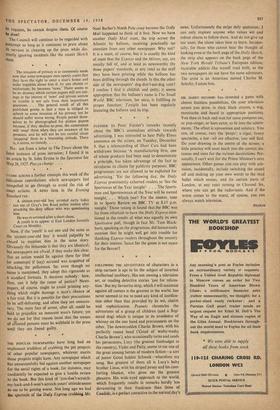CAME ACROSS a further example this week of the ridiculous
convolutions which newspapers feel compelled to go through to avoid the risk of court actions. A news item in the Evening Standard ran: A sixteen-year-old boy arrested early today ran out of Gray's Inn Road police station after attacking the .duty officer who was questioning him.
He was re-arrested after a short chase.
A youth is to appear at East London Juvenile Court on Monday.
Now if the 'youth' is not one and the same as the 'sixteen-year-old boy' it would palpably be absurd to mention him in the same story. Obviously the innuendo is that they are identical; but newspapers are afraid, if they make this clear, that an action would lie against them for libel (or contempt) if (say) accused was acquitted of attacking, the policeman. So, even though no name is mentioned, they adopt this rigmarole as a standard formula. It deceives nobody: how, then, can it help the cause of justice? News- papers, of course, ought to avoid printing any- thing which might damage a man's chance of a fair trial. But it is possible for their precautions to be self-defeating; and often they are unneces- sary. The mere fact of arrest, after all, could be held to prejudice an innocent man's future; yet we do not for that reason insist that the names of arr'ested persons must be withheld in the press until they are found guilty.

























 Previous page
Previous page